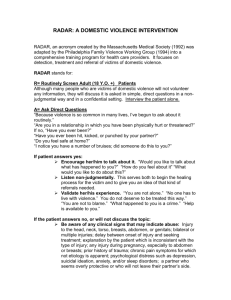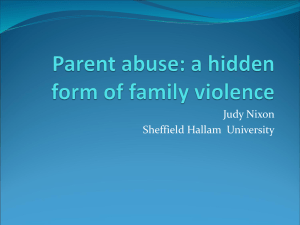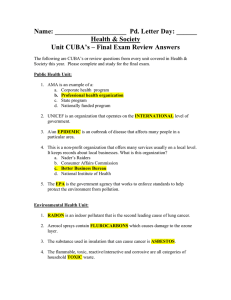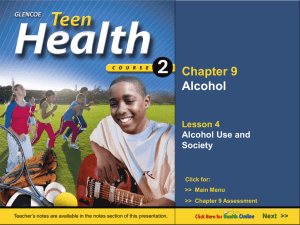Click here to the Annual Report 2008 – 2009
advertisement
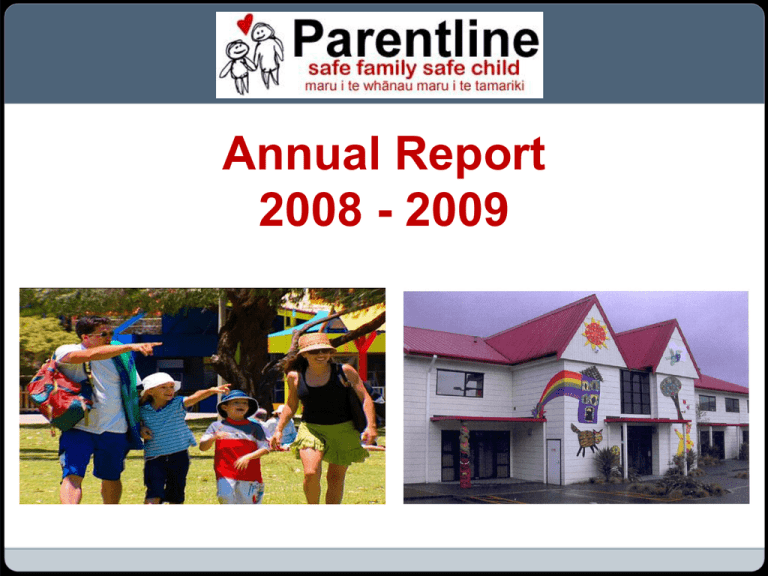
Annual Report 2008 - 2009 Ko te whakakotahitanga o to tatou wairua manaaki i te pupuri i te Tino Rangatiratanga o nga whakawhanaungatanga. The oneness of spirit and caring in upholding the nobility of relationships Introduction: Parentline was established in 1978 as a telephone advice service for parents and caregivers. Over the years, the agency has evolved to offer individual and group counselling, therapy and social work services to children aged between 0 – 13 years; our core business is to work with children who have been traumatised by abuse or domestic violence. We also offer parenting programmes. Our staff are all qualified and experienced counsellors or social workers; we employ a parttime clinical psychologist. At a governance level, the Board of eight Trustees, sets the vision and strategic direction for Parentline. The Chief Executive and Senior Management Team ensure services and operations are aligned to the Board’s strategic direction. Most of our funding is derived from government contracts from the Ministry of Social Development, Child Youth & Family, Waikato District Health Board and the Ministry of Justice. Revenue is supplemented by community grants, Trusts, Philanthropic funding and sponsorship. Although our services are primarily based in Hamilton City, the agency regularly receives referrals from outlying areas. During this financial year, Parentline offered a 12 month pilot service in four (4) Taumarunui primary schools; this contract will expire in December 2009. BOARD Margaret Evans, (Chair) Grant Blackler, Paul Dickey, Mavora Hamilton, Tonga Kelly, Tom Roa, Ngapare Hopa, Rahera Barrett-Douglas CEO Cathy Holland Receptionist Julie Oliver PA Administration Naomi Strother Cleaner Karen Beazley Service Delivery Manager Angie Lloyd Tina McCarty Acting Team Leader Ailine Daisa Social Worker Carina Conradie Clinical Psychologist Catherine O’KellyShinohara Counsellor Michelle Van Tiel Counsellor Rena Marshall Taumarunui Social Worker Peter Edmonds Alternative Care Students on placement Counsellors and Social Workers Pare Thomson Team Leader Funding and Marketing Manager Jane Hendriks Counsellor Volunteers Dennis Beazley Counsellor Leah Hawkins-Coffey Counsellor Lisa Herewini Intake Coordinator 2008 - 2011 VISION GUIDING PRICIPLES STRATEGIC PRIORITIES Keeping children safe from abuse and family violence. We will achieve our vision and priorities through: Investment priorities that will guide our decision making : MISSION We are committed to: Affirming Parent line's authority as THE Child Advocate for the prevention of abuse and family violence. Providing professional evidence based counselling & therapy for children who have been abused and/or witnessed domestic violence. Engaging in research and development activities in the prevention of child abuse, family violence and child advocacy. Establishing an education & training function for counselors & therapists. Underpinning commitment to Treaty of Waitangi, United Nations Convention of the Rights of the Child, United Nations Declaration of Human Rights Excellence & professional integrity in the eyes of our clients, stakeholders and the sector to enhance & facilitate our ability to work collaboratively and in partnership. Strengthening the organisation to ensure an enduring foundation for the development and implementation of core business activities. Learning through research and evaluation to ensure we are making progress, maximising impact and being effective. Alignment & targeting of all that Parentline does to concentrate our efforts on achieving our strategic priorities. Adding value by leveraging our resources and working with our partners to improve performance and achieve greater impact across the sector. Advocating for children Parentline will invest in: · Strategies to ensure the child’s voice is heard · Relationships & partnerships with stakeholders and communities. Access to high quality services Parentline will invest in: · Qualified people · Best practice · Sound governance and management · Robust infrastructure, systems and processes · Being a good employer Evidence based practice Parentline will invest in: · Providing empirical evidence to support effective strategies · Producing innovative strategies Skilled Workforce Parentline will invest in: · Developing workforce potential within Parentline and across the sector. Secure Funding Parentline will invest in: · Sourcing long term sustainable funding · Consolidating core funding streams · Growth and development funding Our Ourvalues values: Advocacy We will protect the rights of the child by challenging an individual, institution or society as a whole, for and on behalf of the child. Service We will provide services that are client focused and responsive to the needs of children, their parents, family members and the broader community. Professionalism We will act professionally at all times delivering the right service to the right person, at the right time and in the right way. Respect We respect and acknowledge the unique diversity and differences of individuals, family and whanau that make up the fabric of our communities. Excellence We strive to achieve excellence in all that Parentline offers to our clients and colleagues. Partnerships Our strength is in the quality of our relationships with key stakeholders and communities of interest Integrity Our intentions and endeavours are honest and honourable in all that we do. Our core services services: Advocacy Protecting the rights of the child by challenging an individual, institution or society as a whole, for and on behalf of children. Art Therapy – Children Helping children to make sense of their world, using play, art, sand tray modalities. Individual Counselling & Social Work Qualified counsellors and social workers are available for children and their whanau to maximise their potential through therapeutic intervention. Family Therapy Specialist focus on family relationships. Groups Group sessions catering for education, intervention and therapy with children & parents Alternative Care Options Planned ‘time out’ to benefit children and families. Brokerage Information sharing and access or referral to other community agency / organisations Core Services Our clients: For the year 2008 – 2009: • Parentline worked with 564 clients; • 72% of clients were aged between 6 – 12 years • 37% of referrals were self referrals; referrals for boys far exceeded the number of referrals for girls • By far the most predominant referrals were for children who were emotionally abused • 64% of referrals had an underlying issue of domestic violence. • 44.6% of referrals resulted in children receiving individual counselling and therapy • Lack of parenting skills is consistently a reason for a referral • The usual duration of an intervention with a single client is four (4) months. In recent times, the nature and complexity of referrals has increased as has the volume of referrals. Our greatest asset Our greatest assets: • • • • Passionate practitioners who want to make a difference Qualified and competent practitioners: • 5 x Social Workers (ANZASW membership) • 6 x Counsellors (NZAC membership) • 1 x Clinical Psychologist . (NZ Psychologists Board registered) • University & WINTEC Social Work & Counselling students on placement (3rd Year) Solid and robust organisational infrastructure Approved provider status with CYF, DHB & Ministry of Justice Looking at the year 2008 – 2009: Family Violence on the Increase At the time of writing this Annual Report, it is evident to the Board of Parentline that family (domestic) violence continues to be the dominant social issue for New Zealand. Significant numbers of the nation’s children have been and will continue to be at risk because of this, despite decades of government initiatives and zillions from the public purse. On 1 October, crime statistics for the 2008-09 year to June 30 were released, confirming new records for violence, family violence and youth violence. This followed an August call from Minister Tariana Turia for “fresh thinking and new approaches to make the difference”, saying this is “time not just for bold words but decisive action” (Te Rito News, August 2009). She noted the 12.4% rise in family violence during the 2008 calendar year. According to the latest official Police statistics, ‘significant’ increases in family violence reports have been recorded amidst a ‘dramatic’ rise in violent crime for the 12 month period ended in June. (Police NZ & WT-1.10.09). For Hamilton, the family violence rate leapt up 40%, overall violence by 25%. And last year this local increase in violent crime was the second worst in the country (NZH 1.4.09). The trend has been high rise for the past four years in both the city and across the Waikato; this coincides with the establishment of Hamilton’s Family Safety Team pilot project, the collaborative effort linking the NZ Police, with Parentline, Te Whakaruruhau, the Hamilton Refuge Support Service and HAIP (Hamilton Abuse Intervention Programme). Violent crime in the region has almost doubled in that time, from a six year average in 2004-05 of 2900 recorded offences to 5060 in 2008-09, up over 16% each year (NZ Police). Looking back over the past decade, family violence has also been recognised as a consistent factor behind notifications to Child, Youth & Family Services (CYFs). Numbers have escalated across New Zealand, from 26,000 in 2000, almost doubled to 53,000 by 2005, then doubled again to 110,797 in the 2008-2009 year ended in June. When this year (2009) is compared with 2008, the average monthly tally is up more than 15%. It is noted that the data includes multiple records of the same children and families. Locally, it is the same with Police call-outs; continuously increasing family violence reports and more than 40% repeats to the same families. Around half report children present although it is recognised this is under-recorded and so they remain the ‘silent victims’. Two contextual elements darken the picture. Police suggest their records show that criminal offences generally are holding at a level reflecting population growth (just over 1%pa), yet violence is on the rise. Secondly, there is widespread acknowledgement that most violence remains hidden, with official estimates placing 80% of family violence as unreported to Police. The reasons are well-researched. Women will turn to family, friends, or colleagues, as well as teachers, doctors and local agencies such as refuges rather than the Police. Referrals to Parentline can also be the ‘call for help’ for the mother and family, not just the children. And while the nation shudders in horror at the latest child killing, headline or sound-bite events because of their inevitable disclosure, hundreds of adults continue to abuse their children. For every child death from maltreatment, there are likely to be 600 children being abused and on average 150 of these cases involving substantiated physical abuse beyond emotional abuse and neglect (UNICEF 2003). Most child killings occur in families who are not registered with CYFs, although they may be known to other government agencies. It’s nearly two decades since HAIP (Hamilton Abuse Intervention Pilot) was set up to monitor Police and other services responding to family violence (in 1991). At that time women’s refuge studies indicated up to 90% of family violence incidents were witnessed by children. Hamilton also provided the fertile ground for the establishment in 1994 – out of Parentline - of Child Protection Studies (now known as CPS Training) to increase awareness of child abuse and promote ‘child protection’. In that period New Zealanders have been exposed to a continuous series of multimillion dollar government promoted television and media campaigns exhorting us to change our ways, a multitude of new strategies and new units aimed at reducing violence, and library-size government funded research. But still the outcome is increasing person to person violence, in particular within families, and with ongoing consequences for children. We Know It’s Not OK For too long, while many officials have referred to the vein of violence in our society, year after year the line spins out that signs of increasing violence reflect improved recording rather than a developing culture. The reasons given for the expanding data include the latest national awareness campaign, better training and awareness education, more faith in the system, improved public services, etc. However, community agencies such as Parentline, Te Whakaruruhau & the Hamilton Refuge Support Services, along with teachers and others working at the front line have long seen for themselves the realities of the trends. Our intimate indicators of violence come from our clients, the children who are Parentline’s raison d’être and their families. The wider deeper picture is disclosed from the nation’s official records, for example the data gathered by the Police, MSD and its CYFs division (Ministry of Social Development and Children, Young Persons, & their Families), as well as the catch-all Statistics Department and global agencies such as UNICEF. The research mountain is larger than Everest. Perhaps the most disturbing trend, along with the overall increase in violent interpersonal behaviours, is that children are exhibiting violence at younger ages, as Ministry of Education reports attest. Parentline’s Experience 2008-2009 Family violence is the most significant driver of Parentline’s core services for children and for their families, although initially it is most commonly hidden amidst a range of risk factors and behaviour patterns presented as the reasons for seeking our assistance and support. During the year ended in June, only 1% of those contacting Parentline pinpointed experience with domestic violence as a reason for the referral, although one in three (34%) cited concerns related to parenting, adult relationships and family support. However, as the children (and their families) became engaged in our programmes almost two out of three (64%) went on to disclose an underlying issue of violence at home. ‘Whilst children come into the service under different eligibility criteria for either emotional or physical abuse, there is a common theme identified that these children have experienced or witnessed domestic abuse at some point in their childhood. (CEO Cathy Holland) Family risk factors identified at the time of referral also included physical and sexual abuse, grief and loss, neglect, parents with mental health issues, and grandparents responsible for the children. Concerns about the children included sexualised behaviour and anger management. Parentline’s typical child is a primary school age boy; 72% spanned 6-12 years in age, and 6 out of 10 were male. While 20% did not disclose their ethnicity, almost 38% selfidentified as Maori, and an increasing number as Pacific Island and Asian. There is also a trend of increasing number of parents and caregivers wanting to attend Parentline parenting programmes. Programme development included Year II of Te Hiringa Tipua (developed for & by Māori families), and the innovative PHO-funded pilot ‘integrated out-reach’ programme based in four primary schools at Taumarunui Initial evaluations of these programme confirmed positive results and the target now is further development. Negotiations are underway to confirm future funding for the schoolbased initiative which we plan to roll-out in Hamilton and beyond. There is a trend towards more complex cases requiring more intensive and lengthier therapy, with the children themselves exhibiting violent behaviours at an increasingly younger age, and as noted earlier in this report, the disclosure of family violence in significant numbers of their homes. Almost half of the intervention strategies involve individual therapy and a third group therapy, however the Taumarunui project has resulted in renewed interest in the group approach alongside family therapy as effective modalities. Parentline’s group programmes include Te Hiringa Tipua, Kids Against Violence (KAVe), Keeping Ourselves Safe (KOS), Totally Awesome Kids (TAK), Transformers and Positively Parenting. Chief Executive, Cathy Holland chairs the Hamilton District Management Team overseeing the management of the collaborative Family Safety Team pilot project (now the Citywide Strategic Forum of organisations & agencies involved in domestic violence). There is a continuing and strong commitment to collaboration with other agencies working in the field of child protection and family violence, but frustrations with the Family Safety Team pilot project and the need for progress in response to Police callouts and the POL400 recording system. The focus is to develop more effective frontline services (intervention and prevention) and this presents ongoing challenges in the year to come. This is a particular response to the high level of repeats in Police callouts to family violence incidents, the high numbers of children exposed to these situations on a daily basis, and the ongoing inability to attract realistic government resources to provide ‘life-changing’ services while hundreds of thousands of dollars are poured into research, policy and publicity (Refer separate Paper on Violence in Context). The Chief Executive reports monthly to the Board on a set of agreed strategic priorities which cover child advocacy, provision of (& access to) high quality services & evidence-based practice from skilled staff, and funding security. She also reports on compliance with contracts including the core Integrated Contract with the Ministry of Social Development, Child, Youth & Family Services, and the Waikato District Health Board. An informal staff feedback forum with the board precedes the monthly board meeting. In addition to this Annual Report, Parentline has produced a Special Report on Family Violence ‘We Know It’s Not OK’, along with an historic snapshot ‘Violence in Context’. These are being made available to the relevant Ministers and are publicly available. The ‘context’ includes reference to New Zealand’s social and political climate, the August 2009 child discipline referendum, & the Infometrics Report on the $2billion annual cost of child abuse and neglect. The following presents other highlights of the year – Meeting with Minister Tariana Turia On March 6, board members and staff met with Tariana Turia, the Associate Minister of Social Development & Employment, as well as Health, and Minister of the Community & Voluntary Sector. The purpose was to discuss our concerns and response to increasing violence in our families, homes, schools, and communities, the work we do and our collaboration with kindred agencies such as Te Whakaruruhau & Women’s Refuge. We presented to her our concept of school-based services aimed at fostering the crossagency integrated ‘working together’ model which positions children and families at the heart of neighbourhoods through their local primary schools. The result – as Taumarunui illustrates – is children who feel good about participating in school life and learning. Although our pilot funding came through the PHO, we emphasised the view that our Integrated Contract (with MSD & WDHB) opened the door to truly ‘whole of government’ funding (and contracts) that would bring into the tent (appropriately) the Ministries of Social Development (CYFs & WINZ), Health, Education, Justice, Courts & Police etc since inevitably they would all be involved with the children and families who found their way to our door. There was positive discussion around Minister Turia’s ‘whanau ora’ policy concept. Further development of the schools-based project will be a priority for Parentline during 2009-2010. Behaviour Management in Schools – Taumata Whanonga Shortly after the meeting with the Minister, CEO Cathy Holland was invited to attend the national summit on behaviour management in the classroom - Taumata Whanonga 2009, March 16-17, Ministry of Education, Wellington. There was lead-up and post summit publicity that ‘school children are becoming more violent’ (Francis Nelson NZEI, NZH 2.3.09), and that Ministry of Education studies disclosed 20% of children were displaying serious behaviour problems (WT 4.3.09) Cathy reported to the Board that both international and NZ speakers at the summit validated our optimism that the Taumarunui pilot project is effective good practice – ‘by offering intervention at the earliest possible time and in the first stages of things starting to go wrong in a child’s life’. and ‘Whilst the presenting symptoms for children accessing the Taumarunui services will be challenging behaviours, the underlying causes will invariably include abuse and domestic violence’ (CEO report, 19.3.09) Parentline had access to a useful Australian resource ‘Calmer Classrooms – a guide to working with traumatised children’ (2007) produced by the Victorian Office of the Child Safety Commissioner, thanks to our former clinical psychologist Dr Narelle Dawson. This resource was distributed to preschool, primary and secondary school teachers across the state. R18 Means R18 Parentline’s R18 Means R18 Research Report was launched in December, and the findings released to the eight participating Hamilton schools and the media (with good coverage in the Waikato Times). Copies were provided to relevant Ministers, MPs and officials, plus summaries to interested parties. SKYCITY Hamilton Community Trust funded the project ($20,000). Co-researchers were Margaret Evans, Rolinda Karapu & Saburo Omura. Dr Gareth Scott (University of Waikato), Dr Narelle Dawson (former Parentline clinical psychologist), and Rona Larsen (Deputy Chair) provided ongoing support. Narelle & Rona had initially instigated the project. The research surveyed 1187 children aged 5-14years and 496 parents/caregivers – providing an authoritative snapshot of the video game playing habits of the nation’s youngsters. The results confirmed the popularity of video games (91%) and disclosed that 70% said they played restricted games. A total of 588 titles were identified as favourites, with 10% of the games named as the three best played in the last month carrying censorship restrictions as illegal for underage players. Boys’ favourites were car racing, wrestling & war genre, while girls chose karaoke-style singing games, the quiz-style ‘Buzz’ & simulation genre. A public function with Chief Censor Bill Hastings featured examples of the adult-rated games the children had identified as their favourites as well as a short British film on cyber bullying (5.3.09). Mobile phones, and particularly with girls, are the source of increasing concern as bullying devices. The R18 research findings were presented at the Lexus Child and Law conference in Auckland (26.3.09) ‘Children Playing Restricted Video Games-Putting Children at Risk’ (Margaret & Cathy). The conference theme was ‘Protecting Children Today: A Multi Disciplined Approach’. Police national Family Violence Coordinator Inspector Ged Byers presented a paper Reducing Family Violence for the Sake of the Children, and with Starship Hospital’s Child Abuse Centre Clinical Director Dr Patrick Kelly in A View from the Front Line presented compelling insights into the damage to children’s health and wellbeing caused by abuse and family violence. There was some interest in retailer/rental outlet responsibility & whether a pioneering prosecution might encourage legal compliance. This is being monitored. The research report was also provided (on request) to TV3’s ‘Target’ team who featured a filmed ‘sting’ of Auckland and Hamilton video game outlets (broadcast episode 1027) to illustrate ongoing concerns at sales to underage youngsters. Locally, we note the new installation of prominent warning signals for both customers and staff at The Warehouse (Hillcrest) – and that company founder Stephen Tindall had been advised of the research. The research will also feature in a TVNZ/NZ on Air commissioned series currently being produced and due for broadcast in 2010 – working title The Truth About Us. Director Robin Shingleton made the approach to Margaret & Cathy following the Auckland Child & Law conference presentation & spent time in Hamilton filming (8.9.09). Cathy has offered to provide ongoing professional assistance to the series. The R18 research proposal aimed at promoting the development of ‘child-friendly’ video games & utilising local creative skills was presented to the board of Hamilton’s new Soda Inc creative business incubator based in the Meteor Theatre. Contracts & Finances Parentline’s end of year financial position continues to improve. This reflects the new organisational strategies introduced early in 2008 and the first full financial year under CEO Cathy Holland’s leadership. The prudent approach will continue in the coming year, as well as the new emphasis on clearly accountable and effective service delivery. The Board can now be confident of contract performance & compliance – ensuring dollars gained are spent as and where required. We have over-delivered on all contracts. The ‘model’ Integrated Contract of MSD & Health funding (through CYF & the WDHB) has continued to provide some 60% of our revenue and is the primary funder of our core business of services for children. We have been guaranteed its renewal as negotiations continue (1 October 2009). We continue to support the integrated concept of a ‘whole of government’ contract providing clarity in deliverables or specified outcomes as well as funding accountability, but find the contracting environment challenging. A range of other government funding is accessed whenever available e.g. Strengthening Families where we are recognised as a lead agency. However, this has been the forewarned final year of the Child & Adolescent Mental Health contract as a result of the Waikato District Health Board collapsing a range of NGO provider contracts into a single ‘portal’. The Family Safety Team child advocate position has also been concluded, with national providers taking over as initial short-term FST managers, with further reviews underway. These two contracts provided 20% of revenue for the year ($140,000 & $70,000). The Board was advised (June) that the new mental health contractors wanted to continue referring its (new) clients to Parentline for us to continue providing our social work, counselling & therapy services, but without the fees we received under the previously held contract. This illustrates the ongoing challenges relating to children and families in the mental health field – or as we would have it described, the area of mental wellbeing. More so because of the WDHB’s under-expenditure in this area over recent years. Child and family well-being is a continuing subject of international debate as health specialists including psychiatrists and psychologists review ‘mental disorders’ and ‘dysfunction’ and debate whether or not they are worthy of clinical recognition. As an example, the area of family violence has drawn attention to ‘Marital Conflict Disorder’. Our primary concern is the ‘bruising’ of a child’s well-being that comes from exposure to family violence, and our call is for the Health Sector to join across government to recognise the benefits of front-line response from agencies such as ours. The pilot Taumarunui contract has brought new PHO funding to Parentline, but the challenge will be to see that this school-based project attracts the future funding support necessary for its roll-out. We continue to require grants and donations to top up contract revenue, almost $200,000 this year and with a 20% target. We are grateful for the ongoing support we receive from local philanthropics such as DV Bryant Trust, WEL Energy Trust, Perry Foundation, Trust Waikato, & SKYCITY Community Trust. Increased fund-raising efforts are underway. The board’s accountants (Vazey Child) continue to manage the agency’s financial reporting (& records) in association with the Chief Executive and the Finance Committee. This has provided the accuracy and transparency required to track contract and grant funding, and continues to be cost effective. Staff Parentline’s greatest asset and strength is the quality of the staff and their commitment to our overriding purpose of ‘safe family, safe child. Special mention is made of one of our gems - Nola Edmonds, highly respected and richly experienced who finally decided to retire in January. She had more than 15 years with Parentline and will continue to be associated. Chief Executive Cathy Holland continues to perform at a high level, supported by her Senior Management Team of Service Delivery Manager Angie Lloyd and Funding & Marketing Manager Grant Cowie. The organisational emphasis is on trained qualified front-line caseworkers who are counsellors and social workers With an eye on investment in the future, tertiary institution relationships have been fostered and placements offered at Parentline to 3rd year counselling and social work students, enabling practical experience working alongside (and supervised by) highly qualified and experienced therapists. This year this has included the first international students and fits with Parentline’s strategy of developing training and education opportunities. Our thanks: Our needs Parentline acknowledges and thanks the many individuals and organisations who contribute to and encourage the work of our organisation. In particular we acknowledge all of the Parentline staff and their commitment to restore the health and wellbeing of children who have been traumatised by abuse and domestic violence. We also acknowledge the many government agencies, community organisations and friends of Parentline who continue to financially support the work we do. Board members 2008 – 2009 Margaret Evans (Chair) Mavora Hamilton Tonga Kelly Tom Roa Paul Dickey Rahera Barrett Douglas Grant Blackler Ngapare Hopa Lawyers McCaw Lewis Chapman HAMILTON Accountants Vazey Child HAMILTON


